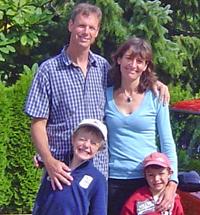
David Lunney, with his wife Catherine and sons
Ben (left, age 8) and Noah (right, age 5).
In August 2007, TRIUMF welcomed David Lunney who is here on a sabbatical leave. This year in Vancouver will be a homecoming of sorts: Canadian by birth, David finished grad school at McGill University (1992) before backpacking to Europe as a post-doc. He eventually became a CNRS scientist in 1995 at the Centre de Spectrométrie Nucléaire et de Spectrométrie de Masse (CSNSM) in the Parisian suburb of Orsay. He has been there since, except for a two-year foray to CERN (1997-1998) where he installed and commissioned the MISTRAL experiment at ISOLDE. MISTRAL is a transmission spectrometer for precision mass measurements of the shortest-lived radionuclides (for example, 11Li). David is also a core member of the ISOLTRAP collaboration at CERN, the pioneering on-line Penning trappers. David’s involvement with precision mass measurements – as well as the Atomic Mass Evaluation performed within his group in Orsay – naturally oriented him to the TITAN experiment here at TRIUMF.
Having worked exclusively at ISOLDE, David was curious to experience a different ISOL facility and chose TRIUMF for its quality and long-term potential. In selecting the TITAN experiment, David has not only sought the excitement of helping launch a new program, but was particularly attracted to the many-fold aspects of the TITAN repertoire for different measurements, such as branching ratios with the EBIT and the recently proposed, novel trace detection method that will combine both the electron-beam and Penning traps. It’s also no coincidence that David spent some time working with Jens Dilling on the ISOLTRAP program at CERN.
Aside from frequent trips to CERN, David’s pursuits in Orsay centre on the development of instruments for beam preparation, usually involving some form of ion trap. His group in Orsay, usually numbering about 10 people, has hosted several students and post-docs who combine the development work with on-line measurements at ISOLDE. Aside from mass measurements, David has dabbled in nucleosynthesis (r process), weak interactions and critical comparisons of nuclear mass models. Much of this work is described in an article commissioned by Reviews of Modern Physics (Vol. 75; July, 2003). He has also started to work with Georges Audi on the Atomic Mass Evaluation, the future of which may become linked with TRIUMF.
When not working, David spends most of his time caring for his family. Before the arrival of his two sons (Ben, 8 and Noah, 5), he was an avid taster of malt whiskies and greatly enjoyed racing 36-foot sailboats, many of which he has watched, wistfully, from the beach at Spanish Banks. Let’s hope that David can rekindle this passion during his stay in Vancouver!
